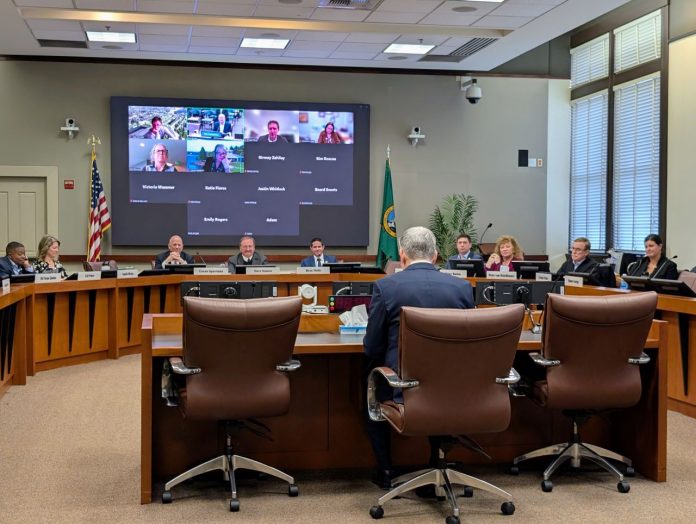
Sound Transit will soon have a new CEO after its board of directors approved the hiring of King County Executive Dow Constantine in a 15 to 0 vote on Thursday. Constantine is a member and former chair of the Sound Transit Board and abstained from the vote himself.
“It is an honor to be chosen as the next CEO of Sound Transit,” Constantine said. “Much of my service as an elected official has been devoted to building the world-class transit system our region has long needed and creating vibrant, transit-connected communities throughout Central Puget Sound. I can think of nothing I would rather do than lead this agency into the future, and I thank the board for their vote of confidence.”
Seattle Mayor Bruce Harrell, who Constantine appointed to the board in 2022, was absent from the meeting, and Everett Mayor Cassie Franklin left early, but she expressed support before departing. Harrell’s spokesperson, Callie Craighead, said that Deputy Mayor Jessyn Farrell attended as his alternate, but did not participate in the vote. Craighead added that Harrell supports Constantine’s hiring.
The contract that the board approved stipulates that Constantine will start on April 1, which will create an opening at his post as County Executive. Two of his board colleagues are already running for that seat, which Constantine was set to vacate anyway at year’s end by not seeking a fifth term, as he announced late last year.
Those two candidates are King County Councilmembers Claudia Balducci and Girmay Zahilay. Constantine appointed Balducci to the board in 2010 and Zahilay in 2024.
In the meantime, under County succession rules, Deputy County Executive Shannon Braddock will be acting county executive on a temporary basis until the County Council appoints a replacement to serve out the remainder of his term. In 2009, the council tapped Kurt Triplett, who had been serving as Executive Ron Sims’ Chief of Staff, to fill a vacancy left by Sims joining the Obama Administration, so Braddock is a strong front contender to fill the role for the full gap.
The winner of the November election will take over as soon as election results are certified, rather than waiting for a normal January handoff. Per state law, whoever holds the County Executive seat is automatically a member of the Sound Transit Board and is empowered with the ability to appoint their County delegation, choosing from local elected officials, so the next Executive will have a big impact on Sound Transit decision-making.
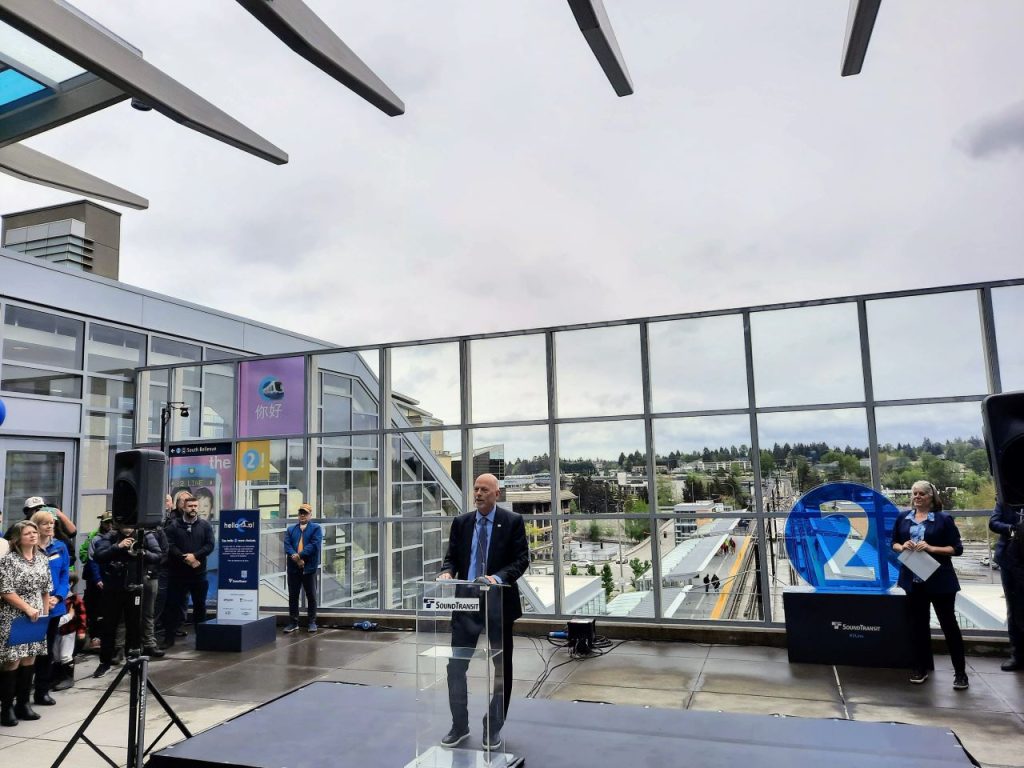
Interim Sound Transit CEO Goran Sparrman was widely praised on Thursday, and Constantine has said he’s asked Sparrman to stick around until May 2 as an advisor. He said appointing Sparrman was one of the best decisions he made as a board leader. Sparrman’s predecessor, Julie Timm, didn’t work out as well, as she resigned after 16 months amidst board dissatisfaction.
Hitting the ground running
Several of his board colleagues touched on the theme of Dow’s ability to hit the ground running and not have a long learning curve given his long history with the agency.
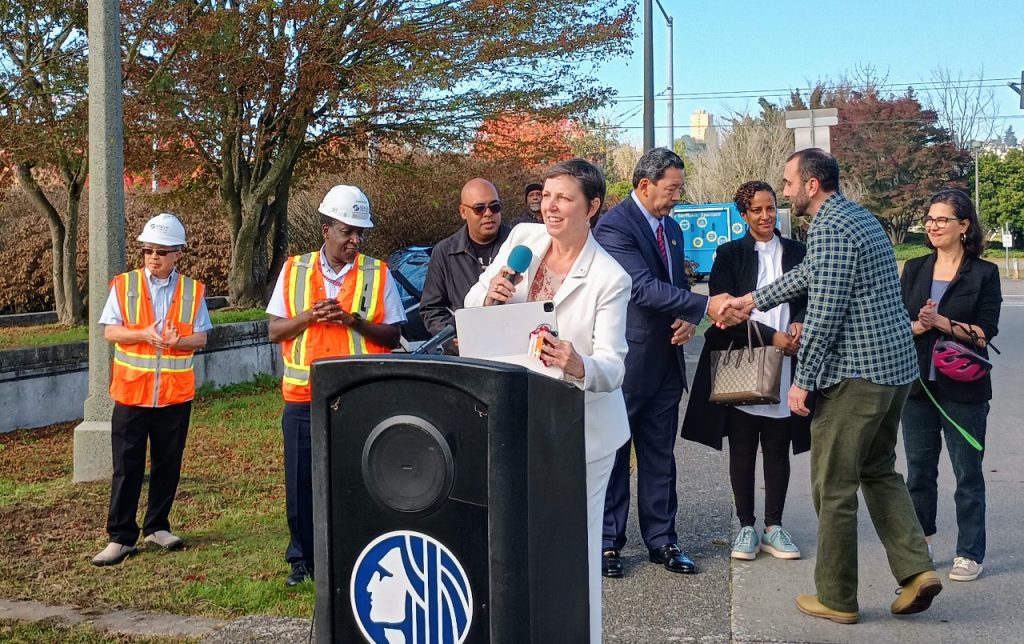
“For every large organization, time is money, and we don’t have time or money to waste delivering on the promise of a truly regional mass transit system,” said Dave Somers, Snohomish County Executive and Sound Transit Board Chair. “Dow can hit the ground running and intimately knows the inner workings of Sound Transit. He has proven his ability to oversee large organizations, run a major transit agency, and maintain crucial partnerships locally, regionally, and nationally that will be necessary to complete the central spine. Our economy and environment will benefit from the success of Dow and Sound Transit.”
Balducci, who chairs the agency’s System Expansions Committee, issued a call to action to the board that it would take a group effort to aid the new CEO in overcoming the numerous obstacles facing Sound Transit.
“I do think that the proof is going to be in our delivery,” Balducci said. “We’re all, as leaders of this agency, going to be called upon to deliver, to deliver the spine, to deliver the projects. We promise to deliver them as quickly as possible and as effectively and efficiently as possible, and to make sure that we are providing a service that is reliable, that people will ride, that’s safe and frequent and comes on time. And so I think that this is a start today. We take this vote. We have a new leader, and we are all then all hands on the wheel, trying to make sure that we deliver for the people.”
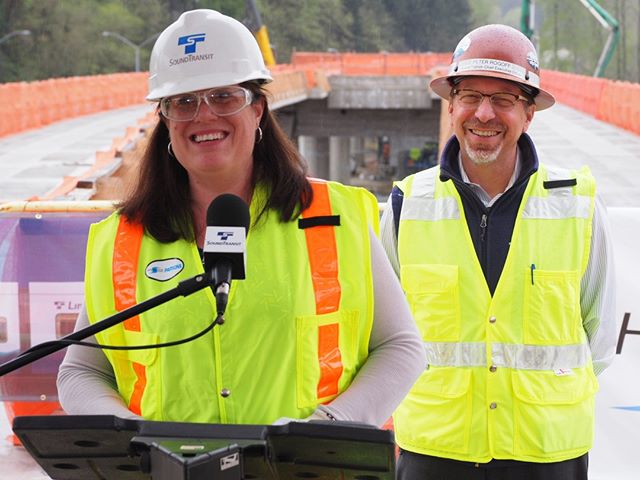
Delivering means different things to different board members. Members tend to be most responsive to projects in the district they were elected to serve. Most board members from Pierce County and Snohomish County emphasized the need to complete the light rail spine between their county seats.
President and CEO of Economic Alliance Snohomish County Ray Stephanson shared a statement in Sound Transit’s press release noting Constantine’s commitment to building the 67-mile light rail spine between Everett and Tacoma — a spine so long it will operate as two lines (with a third partially overlapping) to make operator shifts and passenger load balancing manageable.
“As President and CEO of Economic Alliance Snohomish County, I want to add my congratulations to the Sound Transit Board for their careful and thoughtful deliberations that have led to the nomination of Dow Constantine as the next CEO of Sound Transit,” Stephanson said. “I was privileged to serve with other community and business leaders on one of the interview panels. I came away from the interviews convinced Dow understands and supports completing the construction of the light rail spine to Everett and Tacoma as a high priority.”
The spine focus has at time pushed some board members to press to delay or scale back Seattle’s planned extensions to West Seattle and Ballard. Seattle City Councilmember Dan Strauss, who Constantine appointed to the board in 2024, hinted at this dynamic and argued for building out the entire Sound Transit 3 (ST3) network rather than going down the path of scaling back projects. Strauss lives in Ballard.
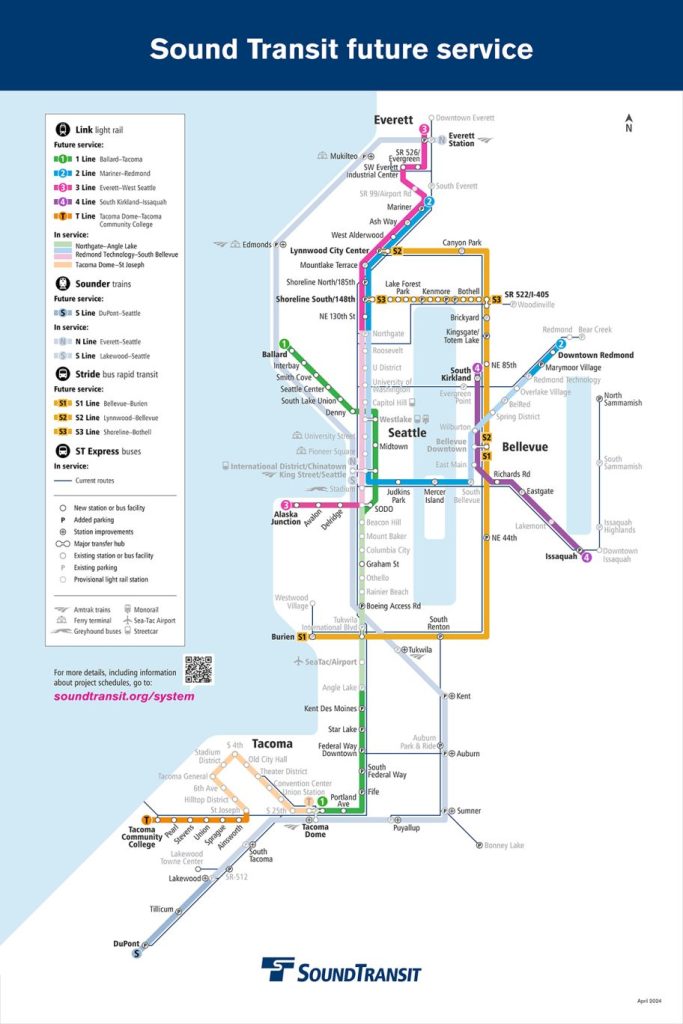
“We have very good regional relationships today, and we also have the potential of that falling apart,” Strauss said. “Because if each of us are pitted against each other for scarce resources, it will not turn out well for anyone. If this were to occur, we would fail as a region, as board members, as has happened in the past, being pitted against each other puts board members into a defensive crouch, which then creates paralysis.”
Strauss also foreshadowed tough conversations around rearranging the order the projects or seeking to build shorter segment while full segment are beyond the financial means of the agency.
“I’ve heard many of my colleagues say that it should not be delayed in favor of other projects,” Strauss added. “The CEO should ensure the goals of ST3 are completed, as described in the ST3 regional system plan for central Puget Sound published in June 2016, understanding that building a minimum operating segment for any project does not meet these goals.”
But some type of financial reset is likely inevitable, as exorbitant cost increases due to inflation and costly property acquisition meet an inevitable assault on public transit funding during the second Trump administration.
Transit advocates split over Dow
Constantine’s candidacy cleaved transit advocates into disparate camps. To some, Constantine was the seasoned, steady-handed statesman ready to take the helm as the agency charted into troubled waters. To others, it smacked of nepotism and a backroom deal doubling down on the status quo approach that has gotten the agency into trouble.
State law shields the identity of CEO candidates from public records requests and Sound Transit has declined to share that information proactively due to pledges given to attract those candidates to apply.
Volunteer-run advocacy group Seattle Subway fell into the latter critical camp.
“Riders were eager for the Board to make every effort to rebuild public trust, starting with a fair and transparent CEO Selection process, but what they got was the appearance of an insider appointment of a sitting board member,” said Seattle Subway spokesperson David Scott in a statement. “We understand the Board’s desire for continuity, but selecting a sitting board member through a closed-door process risks further eroding public trust — especially at a time when confidence in Sound Transit is already fragile.”
Seattle Subway, along with Transit Equity for All, a coalition of Chinatown-International District (CID) advocates, has criticized the agency’s decision to skip the CID and move pledged stations to the edges of the neighborhood, forgoing hopes of a key regional transit hub in the CID. Transit Equity for All packed the room Thursday with CID community members urging the agency to build a 4th Avenue Station and continue to treat a 5th Avenue Station (which is more disruptive to Chinatown) as dead.
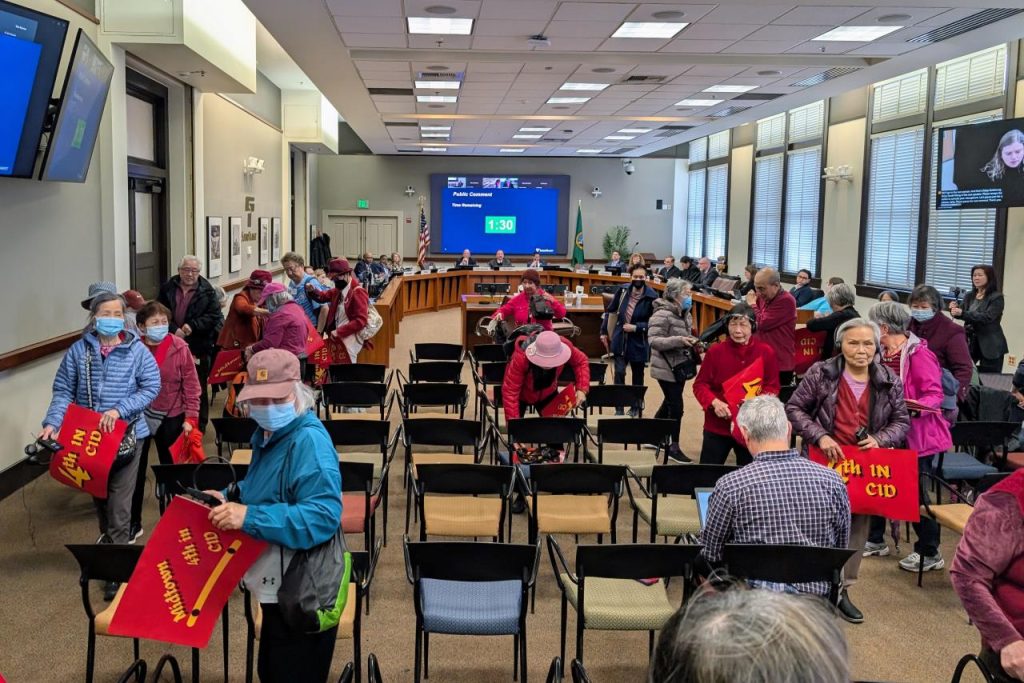
In contrast, Transportation Choices Coalition and Commute Seattle — larger, professionalized groups who have noted they were invited to participate in Sound Transit’s stakeholder process and sit in on candidate interviews — have fallen into the pro-Constantine camp, along with most business groups, such as the Seattle Metropolitan Chamber of Commerce and Downtown Seattle Association.
“The only thing more popular than light rail in this region is getting it done faster. Sound Transit needs a leader who will fight for the agency and deliver the expansion our region voted for,” said Kirk Hovenkotter, Executive Director of Transportation Choices Coalition. “Dow Constantine has been one of the Puget Sound region’s greatest champions for transit. He has the right blend of transit experience and regional savvy to meet challenges head-on and bring great transit to our region.”
Some boardmembers brought up the conflict-of-interest allegations and bristled at them. Constantine himself pushed back on the idea that a conflict of interest exists in an February interview with The Urbanist, arguing that he has followed the guidance given by Sound Transit’s legal counsel.
Auburn Mayor Nancy Backus, who Constantine first appointed to the board in 2016, assessed her fellow Sound Transit boardmembers as upholding of the highest ethical standards and offered a novel defense against conflict-of-interest allegations. She contended that Constantine had saddled board appointees with a difficult and time-consuming job rather than a political favor.
“No one is indebted to Dow Constantine, especially for being appointed to this board, because it is a lot of work,” Backus said. “This is not just a name only board. We are all working all the time to ensure that we are bringing light rail to this region, as we committed to when we put Sound Transit three on the ballot.
Initial term through 2026, with two year-long extensions
While Sound Transit board members do not receive direct compensation for their board contributions, the agency’s CEO will receive a generous compensation package. The contract sets Constantine’s base salary at the low-end of the listed range — $450,000 — but a lucrative six-figure benefits package bumps his total compensation toward the high-end range by his second year.
The CEO contract runs through 2026, with provisions for one-year extensions through 2028. If the board declines to extend Constantine through 2028, they would need to pay a severance package equivalent to one year’s salary plus any unused vacation time.
Constantine is unlikely to stay CEO as long as the agency’s longest serving head, Joni Earl, who held the job from 2001 to 2016 and is considered to have saved the agency from financial disaster as it struggled to deliver on the 1996 Sound Move ballot measure.
Doug Trumm is publisher of The Urbanist. An Urbanist writer since 2015, he dreams of pedestrian streets, bus lanes, and a mass-timber building spree to end our housing crisis. He graduated from the Evans School of Public Policy and Governance at the University of Washington in 2019. He lives in Seattle's Fremont neighborhood and loves to explore the city by foot and by bike.


